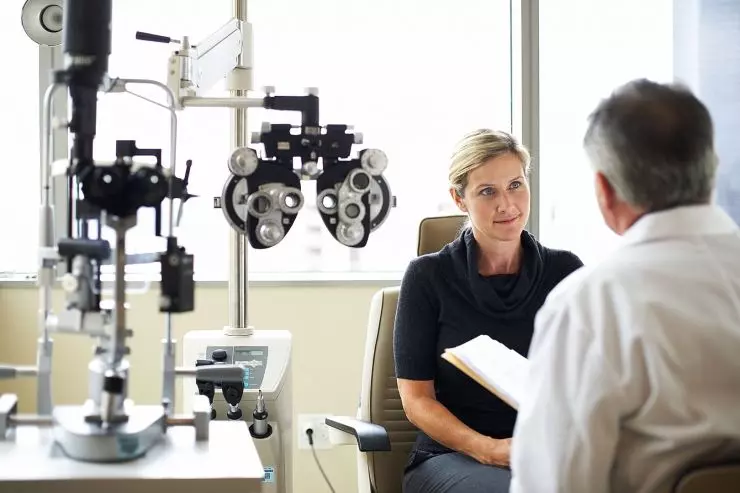
While you likely have heard us preach the importance of seeing us for your regular visits, seeing an eye doctor for regular checkups is just as important. Proactive eye care can significantly impact overall health and quality of life. Think about it: Without your eyes, how different would your life be?
The Importance of Eye Health
Our eyes are our windows to the world, allowing us to experience the beauty and richness of life. Maintaining eye health is crucial not only for clear vision but also for overall well-being. A comprehensive eye exam can detect many systemic health issues, highlighting the interconnected nature of our health.
The Connection Between Eye Health and Other Diseases
Early detection is vital to the treatment and management of most diseases. Many diseases and illnesses, like those listed below, may be detected early via regular eye exams or may impact eye health. See the connection between eye health and other diseases below.
Diabetes
One of the most well-known connections between eye health and systemic disease is diabetes. Diabetes can cause several eye conditions, collectively known as diabetic eye disease, which include:
- Diabetic Retinopathy occurs when high blood sugar levels damage the blood vessels in the retina. If not managed properly, it can lead to vision loss.
- Diabetic Macular Edema (DME): Swelling in the macula (the part of the retina responsible for sharp vision) due to leaking blood vessels.
- Cataracts: Diabetics are more likely to develop cataracts at a younger age.
- Glaucoma: Diabetes doubles the risk of developing glaucoma, which can lead to optic nerve damage and vision loss.
Hypertension (High Blood Pressure)
Hypertension can also have significant effects on the eyes. The condition can lead to:
- Hypertensive Retinopathy: High blood pressure can damage the retina's blood vessels, leading to vision problems and, in severe cases, blindness.
- Choroidopathy: Fluid buildup under the retina due to high blood pressure can cause visual distortions.
- Optic Neuropathy: Reduced blood flow can damage the optic nerve, leading to vision loss.
Cardiovascular Disease
Cardiovascular disease, which includes conditions like heart disease and stroke, can affect the eyes in several ways:
- Retinal Artery Occlusion: A blockage in the arteries supplying the retina, often referred to as an "eye stroke," can cause sudden vision loss.
- Retinal Vein Occlusion: Similar to retinal artery occlusion, but involving the veins, leading to vision problems.
Autoimmune Diseases
Several autoimmune diseases can affect the eyes, causing inflammation and other symptoms:
- Rheumatoid Arthritis can lead to dry eyes, uveitis (inflammation of the middle layer of the eye), and scleritis (inflammation of the sclera).
- Lupus may cause dry eyes, retinopathy, and optic neuritis (optic nerve inflammation).
- Multiple Sclerosis (MS) is often associated with optic neuritis, leading to temporary vision loss and pain.
Thyroid Disease
Thyroid conditions, particularly hyperthyroidism (overactive thyroid), can affect the eyes, leading to:
- Graves' Ophthalmopathy: This condition can cause bulging eyes, double vision, and irritation. It is commonly associated with Graves' disease, an autoimmune disorder that leads to hyperthyroidism.
Cancer
Certain types of cancer can manifest signs in the eyes or affect vision:
- Ocular Melanoma: A rare but severe eye cancer that develops in the cells that produce pigment.
- Retinoblastoma: A rare eye cancer that typically affects young children.
- Metastatic Cancer: Cancers from other parts of the body, such as breast or lung cancer, can spread to the eyes.
Neurological Disorders
Neurological conditions can present with ocular symptoms:
- Optic Neuritis: Inflammation of the optic nerve, often associated with multiple sclerosis, can cause vision loss and eye pain.
- Pituitary Tumors: Can press on the optic nerves, leading to vision problems.
- Myasthenia Gravis: An autoimmune disorder that affects the muscles controlling the eyes and eyelids, causing drooping eyelids and double vision.
Role of Diet in Eye Health
A balanced diet is vital for maintaining a healthy life but can also impact your vision. Certain nutrients are particularly beneficial for eye health:
- Vitamin A: Essential for maintaining good vision and preventing night blindness. Foods rich in vitamin A include carrots, sweet potatoes, and leafy green vegetables.
- Omega-3 Fatty Acids: Found in fish like salmon and tuna, these healthy fats are crucial for properly functioning retina and can help prevent dry eye syndrome.
- Lutein and Zeaxanthin: These antioxidants, found in green leafy vegetables, eggs, and citrus fruits, help protect the eyes from harmful high-energy light waves like ultraviolet rays.
- Vitamin C: An antioxidant that helps maintain the health of blood vessels in the eyes. Citrus fruits, berries, and bell peppers are excellent sources.
- Vitamin E: Helps protect the eyes from free radical damage. Nuts, seeds, and green leafy vegetables are good sources.
By incorporating these nutrients into your diet, you can help reduce the risk of age-related macular degeneration, cataracts, and other eye conditions.
Managing Screen Time
Extended screen time has become a significant concern for eye health in our digital age. Digital eye strain, also known as computer vision syndrome, can cause discomfort and vision problems. Here are some tips to manage screen time effectively:
- Follow the 20-20-20 Rule – Every 20 minutes, take a 20-second break and look at something 20 feet away. This helps reduce eye strain.
- Adjust screen settings to ensure that your screen brightness matches the ambient lighting and increase the text size to reduce strain.
- Keep your screen about an arm's length away and slightly below eye level.
- Anti-glare screens can help reduce the glare from digital devices, making it easier on your eyes.
The Importance of Regular Eye Exams

Regular eye exams are crucial for maintaining eye health and overall well-being. Routine exams can detect eye diseases such as glaucoma, macular degeneration, and diabetic retinopathy early, enabling timely treatment. Additionally, regular exams ensure that your prescription for glasses or contact lenses is up to date, providing you with the best possible vision. Moreover, eye exams can reveal signs of systemic health issues like diabetes, high blood pressure, and even certain cancers, offering a comprehensive health check beyond just vision care.
See our Friends at Crystal Vision Clinic
For those in the Crystal area, we recommend the Crystal Vision Clinic for regular eye check-ups and any concerns about cataracts or other eye health issues. They are conveniently located next to our Crystal office. The team at Crystal Vision Clinic offers comprehensive eye care services, including thorough eye exams, cataract evaluations, and treatments. Their experienced professionals are dedicated to providing personalized care to ensure your vision remains clear and healthy. Regular visits to a trusted eye clinic like Crystal Vision Clinic can help detect and manage eye issues early, providing the best possible outcomes for your vision.
Schedule Your Eye Exam Today
Healthy Vision Month is a perfect reminder to prioritize your eye health. You can protect your vision and overall health by maintaining a balanced diet rich in eye-friendly nutrients, managing screen time, and scheduling regular eye exams. Book your eye exam today!